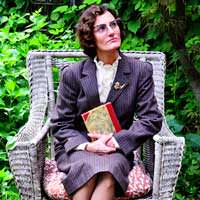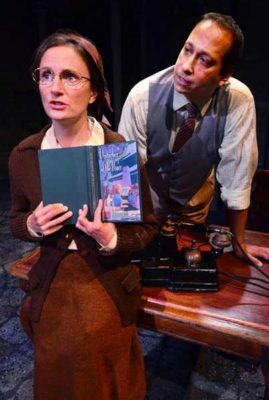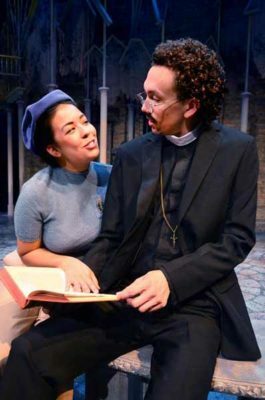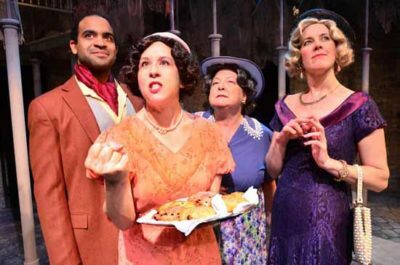Miss Buncle’s Book at Lifeline Theatre

By Christina Calvit
Adapted from D.E. Stevenson
Directed by Dorothy Milne
Produced by Lifeline Theatre, Chicago
A Satire with a Lot of Heart
A feel-good story works best when it’s smart. And Lifeline Theatre has a story that’s both smart and light-hearted in Miss Buncle’s Book, a new play adapted from a 1934 novel by recently rediscovered British author D.E. Stevenson. Though the story is rather complicated (it involves a women writing a book about herself writing a book, twice) director Dorothy Milne keeps the large cast of characters moving efficiently. Anchoring the cast is Jenifer Tyler as the titular Miss Buncle, in a truly magnificent performance as one of the most sympathetic, admirable, and funny characters this season.

Our first introduction to the small town of Silverstream is at a tea party hosted by the horrible Mrs. Featherstone-Hogg (Katie McLean Hainsworth), and attended by her horrible friends. Take, for example, Stephen Bulmer (Martel Manning), who denies his wife tea because she has to get home to ensure their children are in bed in time for him to not see them. Also in attendance is the mousy, drab, demure Barbara Buncle, but she has to leave early to get to London. “As if Barbara will be meeting a man,” everybody laughs. But Barbara isn’t able to escape before somebody arrives with copies of a hot new novel, Disturber of the Peace, written under the pseudonym “John Smith.” Distraught, she flees to the office of publisher Arthur Abbot (Peter Greenberg), where she begs him to withdraw the book, which she, of course, wrote. It is about the people of Silverstream, disguised just enough to avoid lawsuits, but obvious to themselves. Somehow, amid the Great Depression, Barbara had gotten so desperate for money, she wrote a manuscript and submitted it, not expecting it ever really to be published, even after accepting an offer. Now that it has been, there’s going to be chaos.
Disturber of the Peace can’t be withdrawn, and it does, indeed, cause a ruckus. With all their upper-middle-class backbiting having been exposed to the world, certain townspeople, led by Mrs. Featherstone-Hogg, are determined to track John Smith down and publicly horsewhip him. They don’t think their target is Barbara; there’s a character in the novel who is a superfluous nobody and therefore obviously based on her, but there are innocent others for them to torment. Though they’re offended, Barbara’s portrayal of most people is not purely malicious. The book’s “disturber” is a magical boy whose songs cause the villagers to change their lives, and pursue secret romantic desires they’ve always suppressed. Some of their real-life counterparts are inspired to actually do so, and Barbara is delighted by how much happier they are. She even has a growing romance of her own with Abbot. But he wants her to write another book, and the only thing Barbara has ever been able to write about is what surrounds her. To publish her story about publishing a story would be to expose herself as John Smith, and be cut out of society.

In case you’re wondering why that’s a problem, Tyler convincingly portrays Barbara as a woman who, while keenly observant and empathetic, is used to being passive and invisible. Silverstream offers few alternatives to the society she’s used to, and going away to start a new life is not something she has the confidence for. Besides, Silverstream has some nice people: there’s Sally (Kristina Loy), an outspoken young woman whose controlling aunt, Mrs. Carter (Katharine Hildreth) insists on treating like a child, and the idealistic new deacon, Ernest Hathaway (Chris Vizurraga), who has fallen under the sway of local gold-digger Vivian Greensleeves (Elise Kauzlaric). I only wish that every performance could be as nuanced as Tyler’s. Calvit’s script couldn’t have allowed that because it is crucial that the cast feel like a whole village, meaning most actors play multiple roles which don’t get much individual attention. But more variation in speaking and movement and less cartoonish voices would have made greater distinction between roles, and balanced the social satire with character drama. However, the overall story is quite clear, and the other actors play their roles well enough that we understand the impact they have on Barbara Buncle, and how important their happiness is to her and each other. Greenberg as Abbot matches Tyler’s performance to create a sensible, balanced couple.

The rapid shifts in roles also contribute to Miss Buncle’s Book’s sense of playful theatricality. In roles of varying wackiness, the actors are aided by Izumi Inaba’s costumes, which include Barbara’s steadily more striking coats and hats as her confidence improves, and by Alan Donahue’s scenic design, which is elegantly abstract and easy to shift. “Fun” is the best word for the whole evening’s affair; there’s a strong comedy of manners flavor to the story, though it is more expansive in scope. Thanks largely to the main character as written and played, the production also retains a sense of lightness. Late in the play, Barbara is introduced to a new set of people, and appreciates them, even while seeing all sorts of flaws she could satirize. It’s a tricky balance to maintain, but by the end, Miss Buncle’s Book fills a need among the current theatrical offerings for satire with a brain and a heart.
Recommended
Jacob Davis
Playing at Lifeline Theatre, 6912 N Glenwood Ave, Chicago. Tickets are $40, with discounts for students, seniors, and rush; to order, call 773-761-4477 or visit lifelinetheatre.com. Performances are Thursdays and Fridays at 7:30 pm, Saturdays at 4:00 pm and 8:00 pm, and Sundays at 4:00 pm through November 1 (no performances on Halloween). Running time is two hours, with one intermission.
